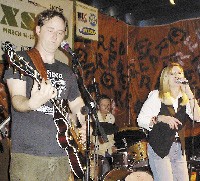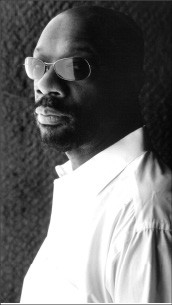Complaining about Austin’s South By Southwest Music Festival almost seems to be a prerequisite for going there.
Standing outside the gloriously grungy dive bar Beerland Friday night, waiting to see his old Oblivians bandmate Jack Yarber play, ex-Memphian Greg Cartwright, of the Reigning Sound, let loose a hard-to-refute litany: “The clubs, the cabs, the hotels, the airport. Everybody’s getting rich except the musicians.”
Cartwright was in town to support Mary Weiss, the former teen-queen lead singer of the ’60s girl-group the Shangri-Las (“Leader of the Pack”) whose recent comeback album (Dangerous Game) Cartwright produced, wrote most of the songs for, and, alongside his Reigning Sound bandmates, played the music on. But Cartwright made clear he was no great fan of the festival.
What do bands get, if not paid? A shot at stardom, allegedly. A chance to play in front of an audience heavy with industry tastemakers from around the world.
Earlier Friday night, on stage at Buffalo Billiards, Eef Barzelay, of the now-Nashville-based Clem Snide, mocked this function of the festival with acid sarcasm: “Validate me, industry,” Barzelay said, gazing out into the crowd. “Give me the keys to your kingdom, dream weavers.”
These are more than valid perspectives, and the crushing crowds, both lined up at clubs and creating perpetual gridlock in the streets of downtown Austin, had me thinking this third trip to SXSW would probably be my last.
 Gary Miller
Gary Miller
From left: Isaac Hayes, William Bell, and Eddie Floyd
But then, Saturday afternoon, I somehow found myself standing 15 feet from the stage as hip-hop legend Rakim led a killer 10-piece live band through a riveting hour-and-a-half-long set. Stalking the stage like a hungry shark, Rakim looked and sounded like it was still 1987. Just one man, one mic, and the most dizzyingly precise flow in rap history. Best live hip-hop show I’ve ever seen. Just when I thought I was through with SXSW, it pulls me back in.
The truth is, with 1,500 or so musical acts playing multiple gigs nearly around the clock for four days, there are as many different festivals as there are participants. And though SXSW is ostensibly geared toward breaking new, emerging bands, for this participant and seemingly for many others, the highlights this year came from artists long past their cultural heyday, with Rakim possibly topped by a band of Memphis soul brothers celebrating a 50th anniversary.
Last year, the big Memphis story at SXSW was the showcase debut of local punk/garage-rock label Goner Records. Goner, under the direction of co-founder Eric Friedl, was on the scene again this year, co-sponsoring a Thursday night showcase along with smaller Memphis imprint Shattered Records. But the big Memphis story was also perhaps the story of the festival itself: a concurrent Thursday night showcase celebrating the 50th anniversary of Stax Records.
An artist’s rendering of Isaac Hayes — on hand to “host” the showcase — adorned the cover of The Austin Chronicle‘s Friday daily section. In their showcase review the next day, the Chronicle wrote, “Austin during SXSW 07 may be known for its cutting-edge acts, but on this night, Fifth Street might as well have been McLemore Avenue in 1963 Memphis.”
 Gary Miller
Gary Miller
Donald ‘Duck’ Dunn and Steve Cropper
The Stax action in Austin got started earlier Thursday, where an afternoon interview session with Stax artists devolved into a free-for-all of fandom and genuflection, a mostly baby-boomer group of reporters and critics armed with albums, CD jackets, and other appropriate canvases for their musical heroes to autograph.
Of course, if anyone in Austin deserved to be worshiped and salivated over, it was these Memphis legends — Hayes, the remaining members of Booker T. & the MGs, Eddie Floyd, and William Bell. And they proved it later that night in a mostly excellent, occasionally thrilling revue-style showcase in celebration at blues warhorse Antone’s.
I showed up at Antone’s more than half an hour before the scheduled 7:30 start time, and the line to get in was already snaking around the block and growing fast. The number of people in line seemed to be about four times club capacity. In three trips to SXSW, I haven’t seen anything quite like it. In fact, I barely got in.
Inside, the Stax crew proved worthy of such attention. Isaac Hayes strode across the stage clad in a red dashiki and sunglasses to offer an introduction: “Tonight is about some very special music. It’s about 50 years of soul music. We’ve come together to celebrate Stax. Can you dig it?”
 Chris Herrington
Chris Herrington
The Reigning Sound and Mary Weiss
And, with that, Booker T. & the MGs took flight, launching into “Melting Pot.” Booker T. Jones set the foundation on organ, childhood friends Steve Cropper and Donald “Duck” Dunn flanked each other on guitar and bass, and modern-era addition Steve Potts kept the beat. There were moments when the quartet lapsed into playing like a very good contemporary blues bar band instead of playing like BOOKER T. & THE MGS, but when Cropper launched the opening riff of “Hip Hug-Her,” you could feel the room levitate, and from then on it was flawless: Cropper lashing out with precision riffs, Dunn crouched down, pushing the music along, Jones leading the band from behind his Hammond, mostly stone-faced but flashing a big toothy grin when “Green Onions” got the whole room dancing. Standing up close, it was hugely entertaining to see all the eye contact and subtle nods that help orchestrate a sound among musicians who have been playing together for 45 years.
After a 40-minute set, the band was joined by original Stax star William Bell, who rivaled Rakim as the most impressive individual performer I saw all week. With a gaggle of Memphis VIPs — including Soulsville matriarch Deanie Parker, Big Star’s Jody Stephens, and Bo-Keys bandleader Scott Bomar — grooving away in the balcony, Bell ripped through a few of his biggest hits. Doing “Never Like This Before,” he sounded like his prime years never ended. But an impassioned reading of his trademark “You Don’t Miss Your Water” was the night’s highlight, Cropper delicately lacing guitar riffs into the title refrain and Jones’ organ lines circling the verses like an ice skater’s figure eights. At the end, even the guy running the soundboard stood up and applauded.
“I don’t get to play with him near enough,” Cropper said, as Bell exited stage left. “He just made my day.”
Bell was followed by Eddie Floyd, who pounded out his classic “Knock On Wood,” among other hits (including Sam & Dave’s “Soul Man”), and Bell and Hayes rejoined the stage for a group reading of Otis Redding’s “(Sittin’ On) The Dock of the Bay.”
 Chris Herrington
Chris Herrington
Alicja Trout
After braving the long line for the Stax showcase, I headed to the opposite end of club row and was greeted with another reminder of the popularity of Memphis music as a smaller but more frenetic crowd gathered outside the bar Red 7 hoping to get into a Norton Records showcase. The New York-based rock-and-roll label had Memphis’ Sam the Sham (of “Wooly Bully” fame) on the bill, but the real attraction was ex-Memphian Cartwright and his Memphis-born Reigning Sound, who played a typically dazzling solo set and then stayed onstage as the backing band for Weiss.
Cartwright and crew ripped through songs from all three Reigning Sound studio albums and reached back to the Oblivians for Cartwright’s take on the gospel standard “Live the Life.” Though Weiss was the ostensible headliner, outside, waiting to get in (another close call), every person who walked up was asking the same question: “Is this the line for the Reigning Sound?”
It had been a long haul for the band to get to Austin. After playing live on Late Night With Conan O’Brien Tuesday night — Weiss sang perhaps Cartwright’s greatest songwriting achievement, “Stop and Think It Over,” which Cartwright released on the last album from his band the Compulsive Gamblers and which Weiss covers on Dangerous Game — the band had driven to Austin in two days.
After closing their own set, the Reigning Sound took a short break and then came back out to back Weiss who, according to The Austin Chronicle the next day, was playing only her second live show in more than 40 years. The rust was apparent. Weiss used an easel with a folder of laminated song lyrics during the set and was a little rattled by a particularly bright stage light. But her nervousness only enhanced her charm, working her way through a set of songs from Dangerous Game with an easy smile and still-girlish grace.
If Stax, Weiss, and Rakim made my SXSW something of a geezer fest, I apparently wasn’t alone. Veteran artists such as Pete Townshend, a reformed Stooges, a reformed Meat Puppets, Robyn Hitchcock (with R.E.M.’s Peter Buck), and the Buzzcocks (I heard them rattling off “I Don’t Mind” through the chain-link fence of a day party en route to meet up with my wife and immediately regretted not being able to see them play) seemed to be the talk of the festival.
Which doesn’t mean there weren’t plenty of buzzed-about or buzz-worthy younger bands on display. Locally, Goner/Shattered featured Memphians the Boston Chinks and Jay Reatard, while Memphis acts River City Tanlines, Tearjerkers, Harlan T. Bobo, and Viva L’American Death Ray Music had official showcases Friday and Saturday night. On Sunday, local blogger Rachel Hurley curated an unofficial day party for Memphis indie-rock bands.
After leaving Austin last March as the most impressive Memphis act in town, River City Tanlines made a repeat bid at their showcase at Beerland late Friday night. Frontwoman par excellence Alicja Trout was in particularly ferocious form, hair flailing as she staggered through her fierce guitar solos as if they were windstorms threatening to knock her over.
But as splendid a presence as Trout was, comparing the Tanlines Friday night to other loud-fast bands at the festival — including the Reigning Sound — revealed that the band’s true weapon is their rhythm section of bassist Terrence “T-Money” Bishop and drummer John “Bubba” Bonds. Bishop and Bonds kept the Tanlines from descending into pure blaring noise whenever the band dove into hyperspeed. But the duo’s real value came through when the band slowed down a little, especially in the moments when Bishop’s loping, locomotive bass lines acted as the lead instrument. That the Reigning Sound is still the better band is only because Cartwright is a songcraft savant. But I didn’t see a rock band in Austin that motorvates quite like the Tanlines.
Among non-locals, the most buzzed-about new acts this year tended to be British (Lily Allen, Amy Winehouse, the Pipettes, the Young Knives), Scandinavian (Peter, Bjorn, and John) or from New York (Oakley Hall, Earl Greyhound). I sought out Allen and Winehouse, whose current albums (Alright, Still … and Back to Black, respectively) I really like, and I came away impressed at how well each performer holds up live.
Fronting a guitar-free six-piece band (drums, bass, keyboards, trombone, trumpet, sax) that ably fleshed out the hip-hop, reggae, and, most impressively, New Orleans R&B accents on her debut album, Allen displayed the musical smarts and force of personality that make Alright, Still … (released in the U.S. in January) an early album-of-the-year candidate.
Her seven-song set mined Alright, Still … for sardonic British hit singles “LDN” and “Smile” and knockout album tracks such as “Knock ‘Em Out” and “Friday Night.” With her polished, melodic pop songs, smart but conversational lyrics, and Everygirl good looks, Allen would seem to have more American crossover appeal than Brit sensations past. Wednesday proved that she can transform her glorious studio pop into an utterly charming live show.
Like Allen, Winehouse is getting tons of good press for an album that deserves it. Back to Black, released in the U.S. this month, is a classic soul/jazz approximation that hits the mark in every way — vocally, conceptually, and, most impressive, musically.
But, as with Allen, I wasn’t sure if this studio pop could really translate live. Which is why I was happy to catch Winehouse at a day party Friday without her full backing band. Armed with only an acoustic-guitar-wielding sidekick, Winehouse — a frankly scary-looking little thing whose current single opens with the kicker “They tried to make me go to rehab/I said, NO, NO, NO” — stepped to the microphone without Back to the Black‘s genius production to protect her and put those songs across naked, nothing but words, voice, and a bare melody. I left a believer.




 Gary Miller
Gary Miller  Gary Miller
Gary Miller  Chris Herrington
Chris Herrington  Chris Herrington
Chris Herrington